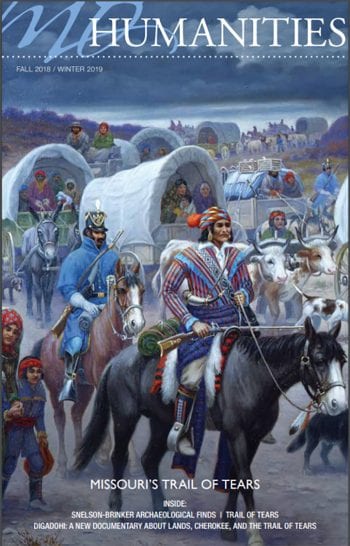“On an autumn day in 1808, elders of the Osage Nation gathered at Fort Clark, a new outpost overlooking the Missouri River near what is now Sibley, Missouri. The council assembled to consider a treaty with the young American republic, a treaty requiring them to give up over 52 million acres of Osage land east of the fort. 
“The treaty was proffered with a threat: sign or become enemies of the United States.”
So begins the article “Acknowledging Native History in Missouri,” in the Fall 2018/Winter 2019 issue of Missouri Humanities magazine, a publication of the Missouri Humanities Council.
More than 100 elders signed the treaty, giving up most of what is now Missouri and half of what would become Arkansas. In exchange, the Osage received the promise of the republic’s protection, $1,200 in cash, and merchandise of similar value, according to the article. The Osage evaded annihilation by accepting the terms.
Acknowledging harms
This fall, the Brown School began encouraging organizers to open public events by reading a Native acknowledgment statement. The campus sits on land ceded in the treaty, and the acknowledgement effort recognizes that the Brown School community bears responsibility for preserving this history and acknowledging harms, write authors Molly Tovar and Chris Leiker. Tovar is director of the Kathryn M. Buder Center for American Indian Studies and professor of practice at the Brown School. Leiker is lead publications editor at the school’s Center for Social Development.
The effort is intended to familiarize the university community and visitors with Missouri’s indigenous peoples, their cultures and a history that reaches 10 millennia into the past. Brown School leaders have asked the university’s chancellor to encourage such statements at the start of all on-campus events.
In Canada, Australia and elsewhere, institutions routinely open public events with indigenous acknowledgment statements, Tovar and Leiker report. In the United States, Northwestern University, the University of Washington and Arizona State University have issued formal acknowledgments. The Missouri Humanities article offers nine sample statements for Native acknowledgement. Here is one: “[Organization name] acknowledges that it is located on the ancestral lands of Native peoples who were removed unjustly and that this community is the beneficiary. We honor our heritage of Native peoples and what they teach us about stewardship of the earth.”
“Acknowledging Native History in Missouri” starts on page 10 of the magazine.